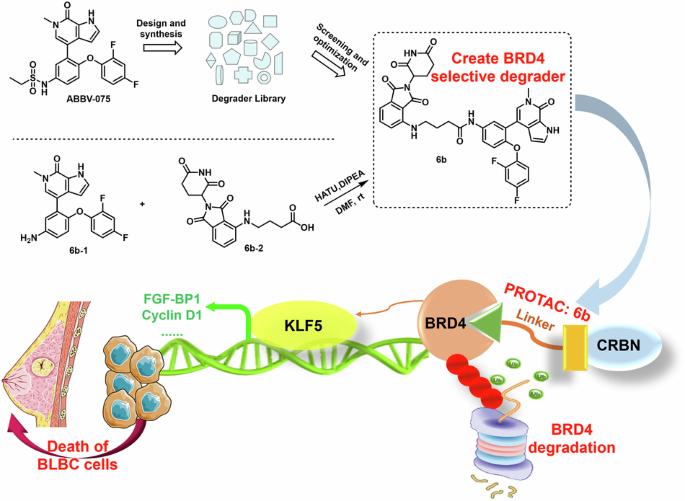BRD4-specific PROTAC inhibits basal-like breast cancer partially through downregulating KLF5 expression
IF 6.9
1区 医学
Q1 BIOCHEMISTRY & MOLECULAR BIOLOGY
引用次数: 0
Abstract
Interest in the use of proteolysis-targeting chimeras (PROTACs) in cancer therapy has increased in recent years. Targeting bromodomain and extra terminal domain (BET) proteins, especially bromodomain-containing protein 4 (BRD4), has shown inhibitory effects on basal-like breast cancer (BLBC). However, the bioavailability of BRD4 PROTACs is restricted by their non-selective biodegradability and low tumor-targeting ability. We demonstrated that 6b (BRD4 PROTAC) suppresses BLBC cell growth by targeting BRD4, but not BRD2 and BRD3, for cereblon (CRBN)-mediated ubiquitination and proteasomal degradation. Compound 6b also inhibited expression of Krüppel-like factor 5 (KLF5) transcription factor, a key oncoprotein in BLBC, controlled by BRD4-mediated super-enhancers. Moreover, 6b inhibited HCC1806 tumor growth in a xenograft mouse model. The combination of 6b and KLF5 inhibitors showed additive effects on BLBC. These results suggest that BRD4-specific PROTAC can effectively inhibit BLBC by downregulating KLF5, and that 6b has potential as a novel therapeutic drug for BLBC.


BRD4 特异性 PROTAC 部分通过下调 KLF5 的表达抑制基底样乳腺癌。
近年来,人们对在癌症治疗中使用蛋白水解靶向嵌合体(PROTACs)的兴趣与日俱增。靶向溴化多域和末端外域(BET)蛋白,尤其是含溴化多域蛋白4(BRD4),已显示出对基底样乳腺癌(BLBC)的抑制作用。然而,BRD4 PROTACs 的生物利用度受到其非选择性生物降解性和低肿瘤靶向能力的限制。我们证实,6b(BRD4 PROTAC)通过靶向BRD4(而非BRD2和BRD3)使其泛素化和蛋白酶体降解,从而抑制了BLBC细胞的生长。化合物 6b 还能抑制 Krüppel-like factor 5(KLF5)转录因子的表达,KLF5 是 BLBC 中的一种关键癌蛋白,由 BRD4 介导的超级增强子控制。此外,6b 还能抑制异种移植小鼠模型中 HCC1806 肿瘤的生长。6b 和 KLF5 抑制剂联合使用对 BLBC 有叠加效应。这些结果表明,BRD4特异性PROTAC可通过下调KLF5有效抑制BLBC,6b有望成为治疗BLBC的新型药物。
本文章由计算机程序翻译,如有差异,请以英文原文为准。
求助全文
约1分钟内获得全文
求助全文
来源期刊

Oncogene
医学-生化与分子生物学
CiteScore
15.30
自引率
1.20%
发文量
404
审稿时长
1 months
期刊介绍:
Oncogene is dedicated to advancing our understanding of cancer processes through the publication of exceptional research. The journal seeks to disseminate work that challenges conventional theories and contributes to establishing new paradigms in the etio-pathogenesis, diagnosis, treatment, or prevention of cancers. Emphasis is placed on research shedding light on processes driving metastatic spread and providing crucial insights into cancer biology beyond existing knowledge.
Areas covered include the cellular and molecular biology of cancer, resistance to cancer therapies, and the development of improved approaches to enhance survival. Oncogene spans the spectrum of cancer biology, from fundamental and theoretical work to translational, applied, and clinical research, including early and late Phase clinical trials, particularly those with biologic and translational endpoints.
 求助内容:
求助内容: 应助结果提醒方式:
应助结果提醒方式:


